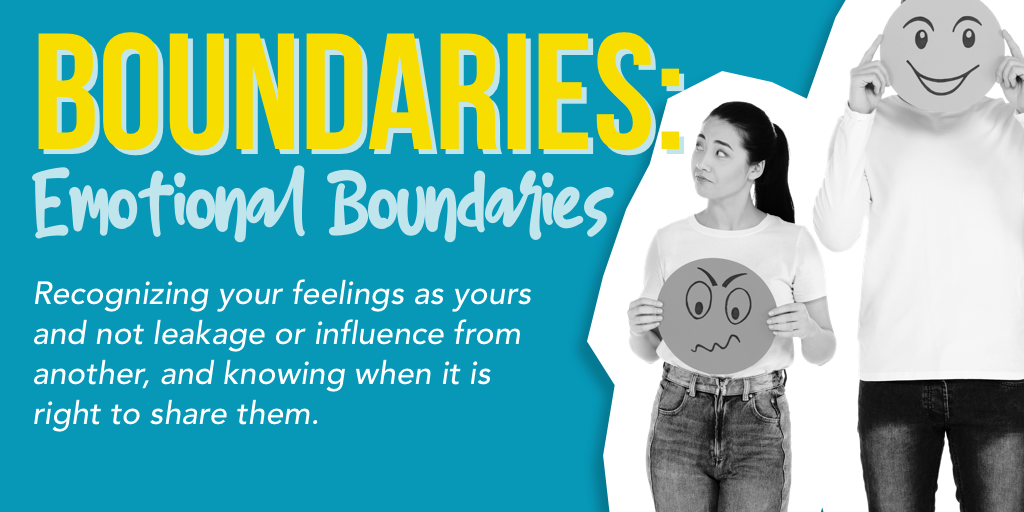Welcome to installment number four in my series about boundaries. The six primary types of boundaries are:
- Physical Boundaries
- Intellectual Boundaries
- Emotional Boundaries
- Sexual Boundaries
- Material Boundaries
- Time Boundaries
For far, I’ve covered material and sexual boundaries and physical boundaries. Today, I’m focusing in on Emotional Boundaries: Feelings.
Which is not something people talk much about.
In fact, the first three boundaries are far more commonly discussed than these last three, however, I would say that none are more important than others, and all deserve some time, attention and thought.
Healthy emotional boundaries: recognizing your feelings as yours and not leakage or influence from another, and knowing when it is right to share them.
For example, when do you speak of emotional trauma or your feelings during the development of a relationship, and when do you prefer to keep things light? What feelings would you like to feel and what feelings are hard limits to you in your interactions?
Boundary violations: occur when someone probes insistently despite your attempts to demur. Or when someone criticizes, invalidates or mocks your feelings. Also, you can violate your own personal boundaries by sharing too much too soon or with the wrong people, and leaving yourself feeling exposed, raw and wrong.
- Are you easily overwhelmed by emotions?
- What feelings are pleasant for you?
- Do you enjoy intense emotion?
- Do you examine your emotions deeply, or “flow” with them?
- Do you allow or welcome others to examine or probe your emotions?
- How do you protect your emotional boundaries?
- What emotions (if any) in others are unwelcome?
- Who do you seek approval from?
- What makes you feel anxious?
- Do you place limits on what emotions you re willing to experience in the presence of others? (For example, do you prefer to remove yourself from company during certain emotional experiences?)
- How do you separate your feelings from how you treat/interact with others?
- How do you keep others’ feeling separate from your own.
- Are you able to say “No,” or decline an offer?
- Are you able to say “No,” or decline an offer easily?
- When others say “No” to you, do you feel rejection?
- Are you open to feeling a full range of emotions, even “negative” emotions?
- What emotions do you consider “negative,” if any.
- Do you lie to others?
- If you lie to others, where do you draw the line? White lies? Lies of omission?
- Do you allow others to lie to you?
- If you allow others to lie to you, where do you draw the line? White lies? Lies of omission?
- Do you speak up or advocate for yourself when your needs are not being met?
- Do you speak up or advocate for yourself when your wants are not being met?
- When do you speak up for your own advocacy?
- Do you value your own emotions and experiences?
- Do you value others’ emotions and experiences?
- Do you want people in your life that will pry or cajole you to share your emotions? Or do you prefer people who will respect a “no,” and leave you alone to process?
- Are you able to withdraw your emotional support when you are running out of energy, to protect your own resources?
- Do you take ownership of your feelings? (Are you responsible for your feelings, and can others “make” you feel a certain way?)
- Do you take ownership of others’ feelings? (Are you responsible for their feelings, and can you “make” them feel a certain way?)
- Are there certain people with whom your emotional boundaries are lower (or nonexistent)? Is this something worth examining/changing, or are you happy with it?
- Do you tend to get overly invested in people who struggle with specific issues you’ve experienced?
- Do you have specific triggers that set of emotional patterns of behavior? How do you handle those, if at all? How would you like to handle those?
- When you do not set a boundary (In this case, ANY boundary), or you allow your boundaries to be crossed (ignored), what emotions are usually responsible?
- When you are there for others who are going through intense emotions, what steps do you take to maintain your boundaries/energy?
These are a place to start with yourself, and with others in conversation or negotiation as you build relationships.
Many of them focus on getting clear about where to take responsibility so you can usually manage your emotions without getting overwhelmed, and to note where you might be carrying the burden of others’ emotions for which you aren’t responsible.
The next writing will be on the topic of Time Boundaries.
What are your thoughts?
Any of these resonate with you? Can you spot them in yourself? Can you spot some of these boundary issues in others in your life?









